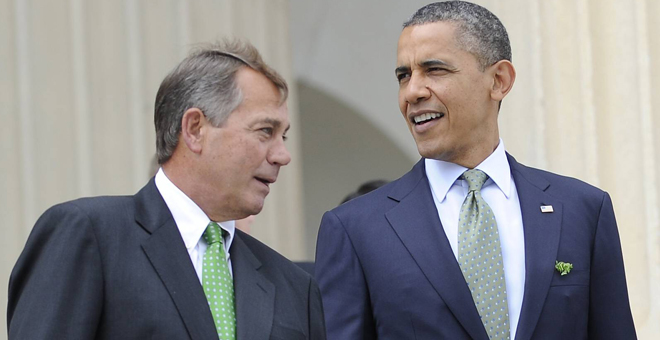Nine months after the famed deficit negotiations between President Obama and House Speaker John Boehner collapsed, the House’s top Republican and top Democrat spent a full week sparring over what really happened at that critical July 2011 juncture. With a debt-limit driven economic crisis looming, Obama and Boehner neared a “grand bargain” on taxes and spending only to watch it splinter, then break apart completely at the 11th hour.
It started Tuesday, when Boehner told CBS Obama “lost his courage” toward the end and unfairly shifted the goal posts at the last minute — a common GOP claim, which the speaker says forced his exit. Obama demanded more revenue after an agreement was struck, the speaker said, and thus “bl[ew] up the deal.”
But House Minority Leader Nancy Pelosi (D-CA) countered in her weekly press conference Thursday that the president was always at the table with Democrats at his side, while Boehner was simply unable to corral his members.
“President Obama was in agreement with the grand bargain that the two of them negotiated last summer,” Pelosi said. “He knew where he was on it, but I think it was important for him to know that we were with him, as we had said all along we are for a grand bargain. You can do many things and the difficult choices that are there if you also have revenue. And I know that the president agreed with that, and that the Republicans walked away. They are trying to revise history now, but it just ain’t so. … It is cute, but it isn’t true.”
Republicans, she said by contrast, dragged the country to the edges of a government shutdown and default on the debt but have splintered every moment that required bipartisanship — from the Super Committee negotiations and the payroll tax cut, to the struggling transportation bill.
So, what really did happen?
The critical dynamic that underscored this saga, according to a plethora of accounts, including TPM’s own reporting, is that Democrats were willing to offer their leader more latitude than were the Republicans.
In July 2011, the two were closing in on a deal that involved $800 billion in new revenue along with far more in cuts to Social Security, Medicare and other domestic programs. After many Senate Republicans signed onto a blueprint — the so-called Gang of Six Plan — which included far more revenues than that, Obama told Boehner he needed $400 billion more or fewer safety-net cuts to hold the support of House Democrats. At this point, a GOP revolt was already building, and House Majority Leader Eric Cantor was channeling their discomfort. Boehner needed an escape hatch. So he declined to return Obama’s phone call and went public with a statement accusing the president of moving goal posts. Game over. Obama then backtracked and offered to return to the original deal, but Boehner said it was too late.
The evidence of this dynamic has since materialized and was on display this week.
On Thursday, Pelosi told reporters that when Obama had asked congressional Dems if they would support him in a deficit deal with fewer revenues than painful cuts, “We said go for it. … We were with him.” To date, Boehner’s members have not said they would have stuck by him in a deal that included significant revenues. And ever since the deal collapsed, Boehner has tread carefully with his rank-and-file.
The grand bargain breakdown was one of the defining moments of Boehner’s speakership and set the tone for the remainder of the 112th Congress. And the truth of how it unfolded sheds light on who’s to blame for the ongoing deadlock on Capitol Hill — which is why both parties are continually spinning history in their favor.






